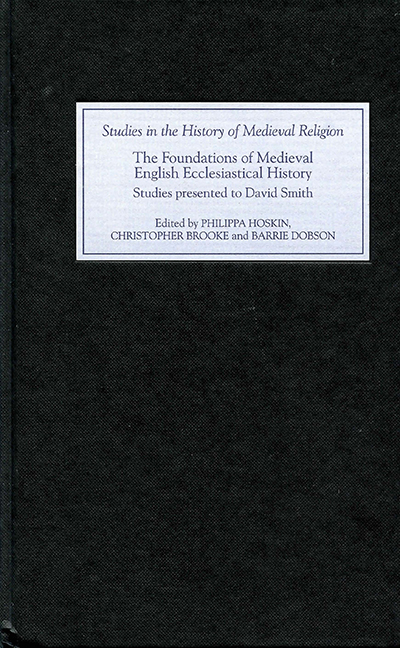Book contents
- Frontmatter
- Contents
- List of Contributors
- Acknowledgements
- Abbreviations
- Miscellaneous Frontmatter
- David Smith: the Scholar
- ‘The archivist is not and ought not to be a historian.’ David Smith and the Borthwick Institute
- Why Forge Episcopal Acta? Preliminary Observations on the Forged Charters in the English Episcopal Acta Series
- Pastors and Masters: the Beneficed Clergy of North-East Lincolnshire, 1290–1340
- The Convent and the Community: Cause Papers as a Source for Monastic History
- Patriarchy and Patrimony: Investing in the Medieval College
- ‘Above all these Charity’: the Career of Walter Suffield, Bishop of Norwich, 1244–57
- The Law of Charity and the English Ecclesiastical Courts
- Continuing Service: the Episcopal Households of Thirteenth-Century Durham
- The Acta of English Rural Deans in the later Twelfth and early Thirteenth Centuries
- The Court of Arches and the Bishop of Salisbury
- Bishops’ Registers and Political History: a Neglected Resource
- The Vatican Archives, the Papal Registers and Great Britain and Ireland: the Foundations of Historical Research
- Bibliography of the Writings of David Smith
- Index
- Tabula Gratulatoria
The Convent and the Community: Cause Papers as a Source for Monastic History
Published online by Cambridge University Press: 24 October 2017
- Frontmatter
- Contents
- List of Contributors
- Acknowledgements
- Abbreviations
- Miscellaneous Frontmatter
- David Smith: the Scholar
- ‘The archivist is not and ought not to be a historian.’ David Smith and the Borthwick Institute
- Why Forge Episcopal Acta? Preliminary Observations on the Forged Charters in the English Episcopal Acta Series
- Pastors and Masters: the Beneficed Clergy of North-East Lincolnshire, 1290–1340
- The Convent and the Community: Cause Papers as a Source for Monastic History
- Patriarchy and Patrimony: Investing in the Medieval College
- ‘Above all these Charity’: the Career of Walter Suffield, Bishop of Norwich, 1244–57
- The Law of Charity and the English Ecclesiastical Courts
- Continuing Service: the Episcopal Households of Thirteenth-Century Durham
- The Acta of English Rural Deans in the later Twelfth and early Thirteenth Centuries
- The Court of Arches and the Bishop of Salisbury
- Bishops’ Registers and Political History: a Neglected Resource
- The Vatican Archives, the Papal Registers and Great Britain and Ireland: the Foundations of Historical Research
- Bibliography of the Writings of David Smith
- Index
- Tabula Gratulatoria
Summary
Among David Smith's many contributions to making known and making accessible the archives held at the Borthwick Institute, his two volumes of lists and indexes to the cause papers generated by the Consistory Court of the archbishops of York are of special interest for historians working in a number of different fields. First designated ‘cause papers’ by Canon Purvis, who was responsible for their earliest listing, the files are a rich source for the church's jurisdiction in matters concerning ecclesiastical dues (the payment of tithes and other offerings), matrimonial cases, defamation, and testamentary business, and the workings of the church courts. The York cause papers consist of 252 files from the fourteenth century, and 308 from the fifteenth. They have been used by Richard Helmholz in his studies of medieval marriage and of medieval charity law, and by Jeremy Goldberg to illuminate many aspects of the lives of medieval women, through childhood and adolescence, work, and marriage, to old age and widowhood. Less well investigated has been the potential of cause papers as a source for monastic history, and it seems appropriate here to salute David Smith's achievements as a scholar and his service to the Borthwick Institute, by offering these preliminary observations on how cause papers illuminate monastic life in the later middle ages, and in particular how they allow us to see medieval monasteries as part of the social fabric of town and countryside, interacting with the local community.
By their very nature, the cause papers that involve members of the religious orders – other than those in which the religious appear as witnesses – are likely to be those that concern their ecclesiastical liberties and rights. Thus we find cause papers relating to tithes, when religious houses are plaintiffs demanding payment, or defendants claiming the right to exemption; there are cases concerning parish churches appropriated to monasteries, or where monasteries held, or claimed, the right of advowson; and cases concerning the provision of chapels and chaplains. Some cause papers comprise a single document, such as the libel, or statement of the plaintiff's case, like that made by the proctor of the prior and convent of Holy Trinity, York, described as ordinis Maioris Monasterii (‘of the “order” of Marmoutier’), in a case against John, rector of Adel church, for the payment of an annual pension of ten marks (CP E. 241).
- Type
- Chapter
- Information
- The Foundations of Medieval English Ecclesiastical HistoryStudies Presented to David Smith, pp. 63 - 76Publisher: Boydell & BrewerPrint publication year: 2005



